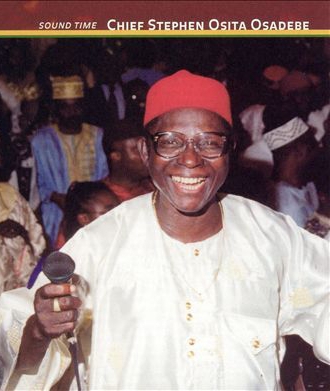Chief Stephen Osita Osadebe Biography
-
 Author
AuthorOkolorji John Kennedy
-
Category
Biographies
-
Views
1713
Chief Stephen Osita Osadebe mostly called Osita Osadebe was a highlife musical legend. Born on March 17, 1936, in Atani, a small town in Anambra State, Nigeria. Chief Stephen Osita Osadebe was destined to become one of Africa's most influential and prolific musicians. Chief Stephen Osita Osadebe is regarded as the king of highlife music.

Chief Stephen Osita Osadebe
Hailing from a humble background, Osadebe navigated the complexities of life, ultimately emerging as a shining example of the power of resilience, hard work, and immense talent.
His journey from obscurity to global recognition is a testament to the indomitable spirit of the African people.
Early Life and Education
Osadebe's father, Chief Dennis Osadebe, was a respected member of the Atani community, serving as a warrant chief. His mother, Ezinne Ivie Osadebe, was a devout Christian and devoted homemaker. The youngest of the couple's four children, Osadebe grew up in a loving and nurturing environment. He attended the prestigious St. Charles College in Onitsha, where he honed his academic skills and gained exposure to Western education and culture.
However, his love for music had begun to take root at a tender age. As a child, he was captivated by the traditional rhythms and melodies of his Igbo heritage. His parents, especially his mother, encouraged his musical inclinations, as they recognized the gift their son possessed. In school, Osadebe was an active participant in various music and drama clubs, performing in local school events and competitions. His passion for music continued to grow, and by the time he graduated from high school, he knew that he wanted to pursue a career in music.
Early Music Career
In 1958, Osadebe joined the Stephen Amache Band as a vocalist and composer. This marked the beginning of his professional music career. With the band, he performed at various social events and gatherings, earning a reputation for his soulful voice and captivating stage presence. However, his time with the band was short-lived, as he soon decided to strike out on his own.
In 1960, Osadebe formed his own band, the Nigerian Sound Makers. He recruited talented musicians from various backgrounds, creating a unique blend of traditional Igbo rhythms and modern instrumentation. The band quickly gained popularity, as their sound resonated with audiences across Nigeria.
The Nigerian Civil War (1967-1970) was a dark period in Nigeria's history. Osadebe, like many other Nigerians, was affected by the conflict, with some of his band members losing their lives in the war. Despite the challenges, he continued to create music, providing solace and hope to those who were suffering. During this time, he released several songs that reflected the pain and suffering of the Nigerian people, as well as their resilience and determination to overcome adversity.
King of Highlife Music
In 1970, Osadebe released "Osondi Owendi," a song that catapulted him to national fame and marked the beginning of his reign as the king of highlife music. The song, which translates to "One man's meat is another man's poison," was a celebration of life and diversity. It quickly became a massive hit, selling over 500,000 copies and establishing Osadebe as one of Nigeria's most popular musicians.
Osadebe continued to produce hit after hit, earning several awards and accolades for his contributions to Nigerian music. He was known for his ability to blend
traditional Igbo rhythms with modern instrumentation, creating a sound that was uniquely his. His music was not only enjoyed in Nigeria but also across Africa and beyond, earning him a global following.
Discography
Over the course of his illustrious career, Chief Stephen Osita Osadebe released numerous albums and singles. Some of his most popular musics Below:
1. Osondi Owendi (1970)
2. Kedu America (1972)
3. Onu Kwulu Njo (1975)
4. Oyolima (1979)
5. Onuigbo (1983)
6. Kedu America (1984)
7. Osadebe in London (1984)
8. People's Club of Nigeria (1987)
9. Osondi Owendi (1988)
10. Kenechukwu (1990)
11. Osondi Owendi (1992)
12. Kedu America (1994)
13. Ana Masi Ife Uwa (1996)
14. Nwanne Awu Enyi (1999)
15. Sound Time (2002)
16. Kedu America (2003)
17. Kanyi Je Bu Onyinye (2004)
18. Sound Time vol. 2 (2005)
19. Kedu America (2006)
Legacy
Chief Stephen Osita Osadebe's contributions to African music cannot be overstated. His unique sound, which blended traditional Igbo rhythms with modern instrumentation, influenced many musicians across Africa and beyond. He was a pioneer of highlife music, a genre that became synonymous with the African sound.
Osadebe's music was not only entertaining but also carried powerful messages of hope, unity, and resilience. He used his music to address social and political issues, championing the cause of the Nigerian people. His music continues to inspire new generations of musicians and fans, cementing his legacy as one of Africa's greatest musical icons.
In recognition of his contributions to music, Chief Stephen Osita Osadebe was honored with numerous awards and accolades, including the Order of the Niger (OON) and the Lifetime Achievement Award from the Nigerian Music Awards.
Chief Osita Osadebe passed away on May 11, 2007(aged 71 years old), leaving behind a musical legacy that continues to touch hearts and souls around the world.
Updated On:
Submit biography
Most Viewed

Chidi Dike Biography
- 118340

Maurice Sam Biography
- 81953

BLord Biography
- 67606

Oluebube Obio Biography
- 55422



0 Comments
Show Comments
Hide Comments
Leave a comment